In recent years, the trend of adopting cloud technologies and Big Data has skyrocketed. Almost 70% of companies claim that Big Data has become a crucial part of their IT landscape, and every tool we use today is software that runs in the cloud or is actively supported by relevant cloud platforms.
Data processing in the cloud comprises data integration, validation, transformation, modeling, and warehousing. This article covers the aspect of data integration tools on the cloud, the benefits, and the business value generated by such data integration tools. We’ll also look at Jitterbit as a data integration tool, its pros and cons, followed by some of its competitors.
Table of Contents
- What is Jitterbit Software?
- How Jitterbit Facilitates Workflow Automation and Integrations
- TOP 10 Jitterbit Competitors
- Conclusion
What is Jitterbit Software?
Jitterbit is a cloud-based data integration platform that allows users to connect to multiple data sources on the cloud or on-premises, perform data manipulation, and deliver enriched datasets quickly without the hassle of setting up any infrastructure locally. The platform allows users to connect multiple systems together with the help of its API integrations and also automates business processes that do not need manual intervention.
Some of the major features of Jitterbit are as follows:
- Cloud Studio. Allows users to design and develop application integration without writing any code.
- API Manager. Enables users to publish and manage APIs.
- App Builder. Provides a low-code interface to build and deploy web and mobile applications with no experience.
- Management Console. A centrally managed console to control and monitor workflow integrations, etc.
Benefits of Jitterbit
Let’s take a look at some of the key benefits of Jitterbit.
- Being an established player in the field of data integration, it has very promising support for high-performant parallel processing of structured and unstructured data.
- It also provides out-of-the-box integration with machine-learning algorithms that allow users to enrich their data without implementing any code.
- Jitterbit also has a component that eases data cleansing between multiple systems.
- For experienced developers, it opens its platform to code for complex data processing jobs.
Drawbacks of Jitterbit
- Migrating pipelines between environments creates duplicates that are overhead and need to be cleaned up later.
- Debugging is, at times, challenging. No checkpoints are available that allow developers to debug pipelines effectively.
- The Standard edition of Jitterbit provides access with 2-3 connectors which might not be sufficient for starters.
How Jitterbit Facilitates Workflow Automation and Integrations
Jitterbit allows users to build integrations with various data sources and tools. Some of the interesting use cases are discussed below.
Workflow Automation
Jitterbit provides a low-code solution for developing and automating manual workflows. Repetitive tasks such as HR approvals, process management, etc., can be incorporated into Jitterbit to empower employees with better and more efficient decision-making and growth.
Salesforce Integrations
Jitterbit provides a native data loader for Salesforce that allows it to connect and extract data from Salesforce easily. Salesforce is a popular CRM tool used by many leading companies in the world. With the help of its connector, Salesforce data can be integrated with other CRM tools such as NetSuite, Oracle, or SAP. When considering social media, integrations with popular marketing tools such as Hubspot and MailChimp also prove to be a powerful add-on to Jitterbit.
Although Jitterbit has established itself as a major player in the world of data integration, it cannot be considered the silver bullet. There are a plethora of popular data integration tools that can serve as Jitterbit alternatives, some of which are also Jitterbit software competitors. Let’s take a look at some of the alternatives to Jitterbit.
TOP 10 Jitterbit Competitors
Skyvia
Skyvia is one of the leading data integration providers in modern days. With its universal cloud data platform, Skyvia provides a powerful data extraction web interface that’s very easy to set up and use. There are 200+ source connectors, including various cloud applications, CRMs, E-commerce, etc., databases, and data warehouses, from which data can be extracted, fetched, and synchronized.
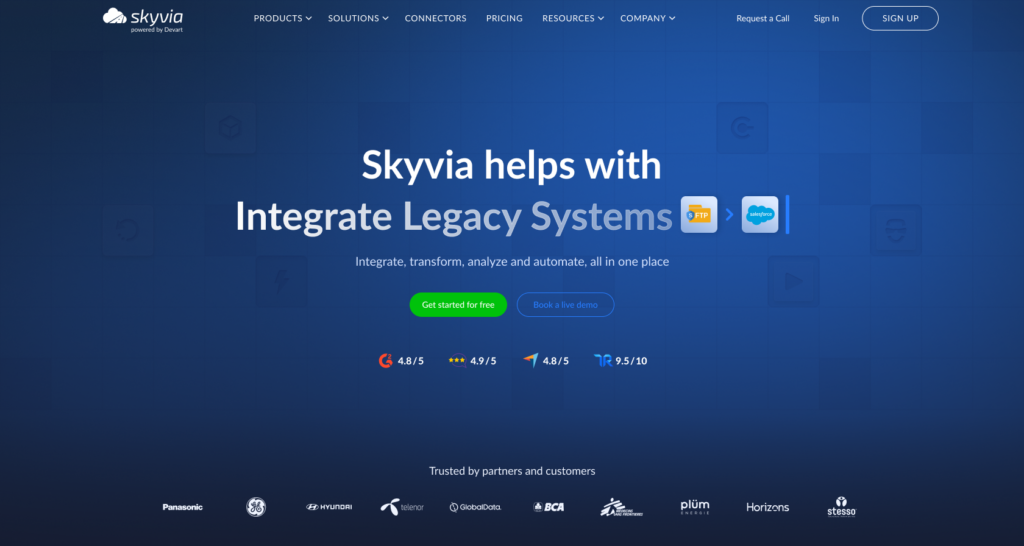
Key features
Skyvia is a one-stop-shop for all business analytics data-related needs:
- extraction, transformation, and loading: ETL, ELT, and reverse ETL.
- synchronization in both directions.
- migration services.
- data management.
- sharing data as REST API.
- cloud data backups, etc.
Use cases
- Data integration and transformation.
- Data orchestration and processing.
- Workflow automation.
Budget
Skyvia provides a Free plan to get started with some limitations on the number of records that can be processed. However, with paid plans such as the Basic or Standard, there are a lot of options possible. It also offers a Business and Enterprise plan for heavy usage.
Industry
- Banking and financial sector.
- Retail.
- Telecommunication.
Fivetran
Fivetran is a cloud-based ELT tool that enables users to extract, load, and transform data from various data sources. As it’s a SaaS application, there is no component to be installed on the servers.
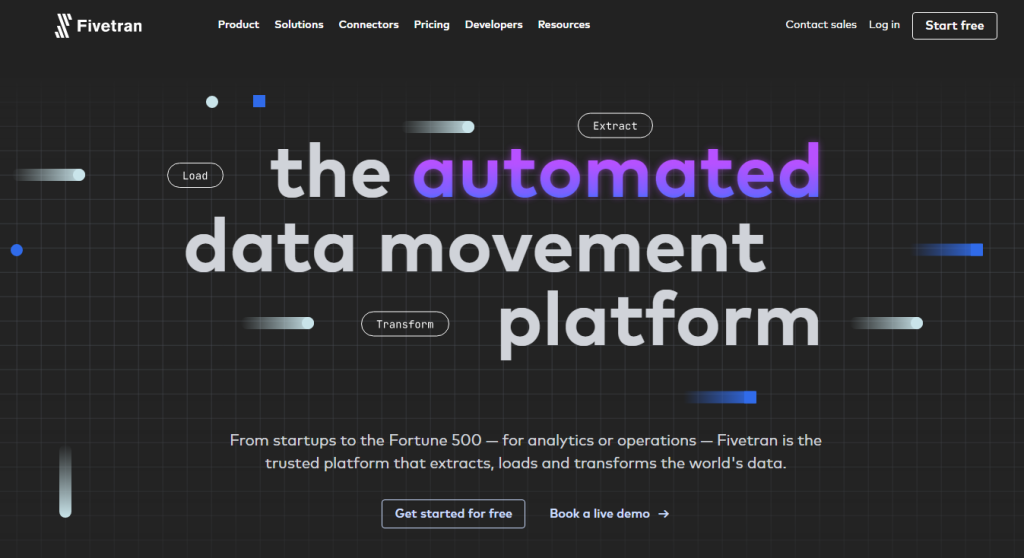
Fivetran provides reliable connectors for Snowflake, Redshift, and other MPP warehouses, which makes it one of the best platforms to start data integration. Fivetran also has an integration with Dbt that allows users to perform analytics on top of the data that is being processed.
Key features
- Lots of data connectors are available.
- Near real-time data replication and synchronization.
- Automated data reporting.
Use cases
- Realtime and batch data processing.
- Social media analytics.
Budget
Fivetran offers a Free plan for individuals to start processing up to 500K monthly active records (MAR). Based on the use case and data volume required to process, customers can choose from Starter, Standard, or Enterprise plan. For example, with the Standard plan, processing 1M records per month would be priced at 526.32 USD.
Industry
- Retail and CPG.
- Financial services.
- Manufacturing.
To learn more about the comparison between Skyvia and Fivetran, check out this guide.
Stitchdata
Stitch is a cloud-based ETL tool that provides access to over 100 data sources. It allows organizations to automate their data processing workflows from on-premise and cloud data sources to data warehouses and lakes.
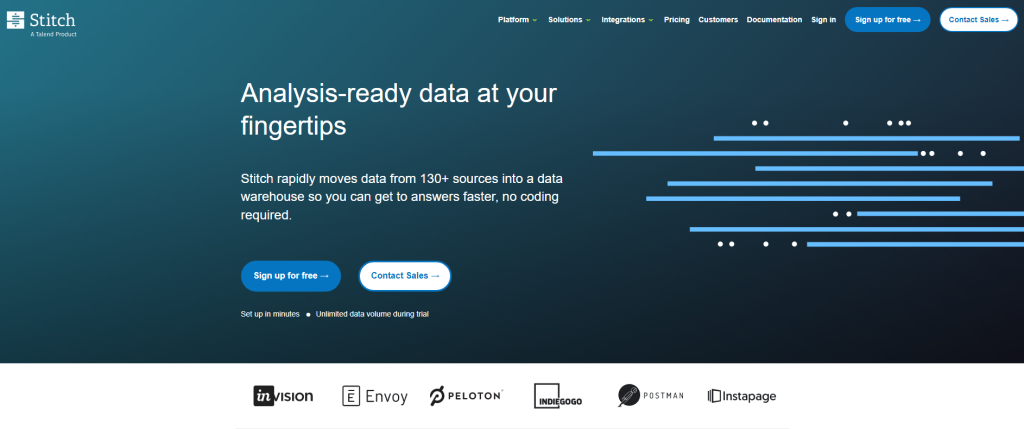
Stitch provides robust data replication and data transformations using its Singer-based replication engine. That being said, Stitch can also be combined with open-source Singer taps and targets to run a data pipeline locally.
Key features
- Connections with multiple data sources.
- Data encryption by default while loading data to data warehouses.
- Integration with open-source Singer taps and targets.
Use cases
- Data orchestration and extensibility.
- Data transformation and data quality.
Budget
With the Standard plan, customers can get started using the trial for free for two months after which the pricing starts at 100 USD to process 5 million rows per month. The pricing for the Advanced plan starts at 1,250 USD per month and Premium at 2,500 USD per month with a potential to process 1 billion rows per month.
Industry
- E-commerce and retail.
- Financial services.
- Software and IT.
To learn more about the comparison between Skyvia and Stitchdata, check out this guide.
Dell Boomi
Boomi is a cloud-based data integration platform developed by Dell. It serves a wide range of applications ranging from data integration, application integration, and API management.
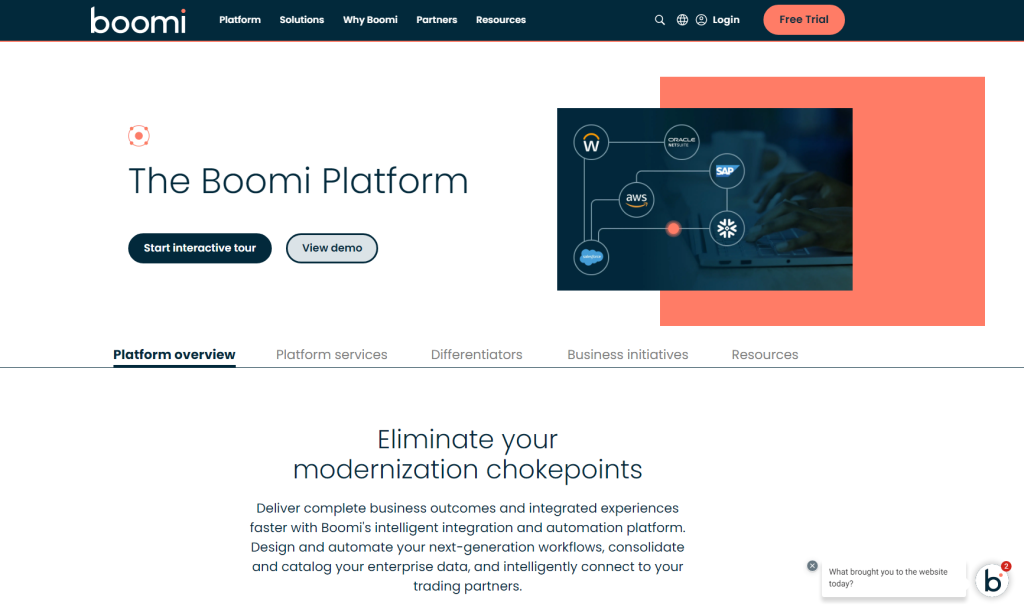
Dell Boomi can be used as an on-premise or as a SaaS application. It provides easy integrations with major cloud vendors such as AWS and Azure. The visual ETL designer makes it easy for users to develop complex data transformations without writing any code.
Key features
- Powerful Data Integration tool.
- Provides functionality to manage enterprise data hub.
- API management solution to allow users to create and deploy custom API solutions.
Use cases
- API management.
- Master data hub.
- Data catalog and preparation.
Budget
Dell Boomi has multiple products in its portfolio that are priced differently. Boomi Integration has a subscription-based pricing plan based on the features and the number of connectors required. Customers can request quotes from the sales team based on their requirements.
Industry
- Banking and financial services.
- Healthcare and life sciences.
- Retail and public sector.
To learn about the comparison between Skyvia and Dell Boomi, check out this guide.
Celigo
Celigo is an iPaaS that provides application integration between various SaaS applications. While it allows a visual drag-and-drop editor to integrate applications, advanced users can also write scripts and use code injection to customize their workflows.
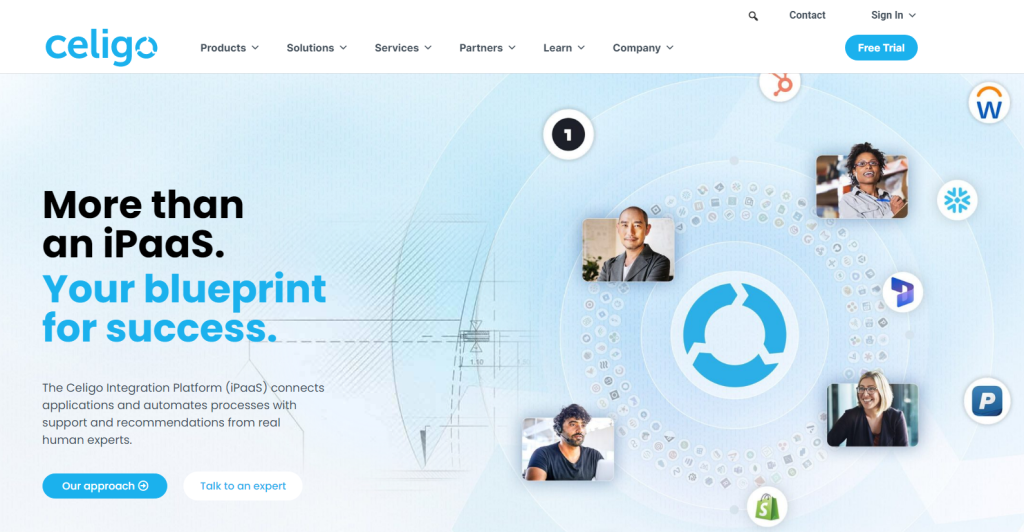
Key features
- Low-code application integration platform.
- In-built process automation tools.
- Leverage pre-built solutions from the Celigo marketplace.
Use cases
- POS terminal integration.
- Integration with CRM systems such as Microsoft Dynamics 365.
Budget
Celigo provides a Free plan for users to get started with. The Standard and Premium plans are priced at 600 USD and 1,200 USD per month, respectively, while the Enterprise plan is priced at 2,500 USD per month.
Industry
- IT.
- Financial services.
- E-commerce.
To learn more about the comparison between Skyvia and Celigo, check out this guide.
Mulesoft
Another popular tool in this segment is Mulesoft. Initially, it provided middleware servicing and later started providing Integration-as-a-Service.
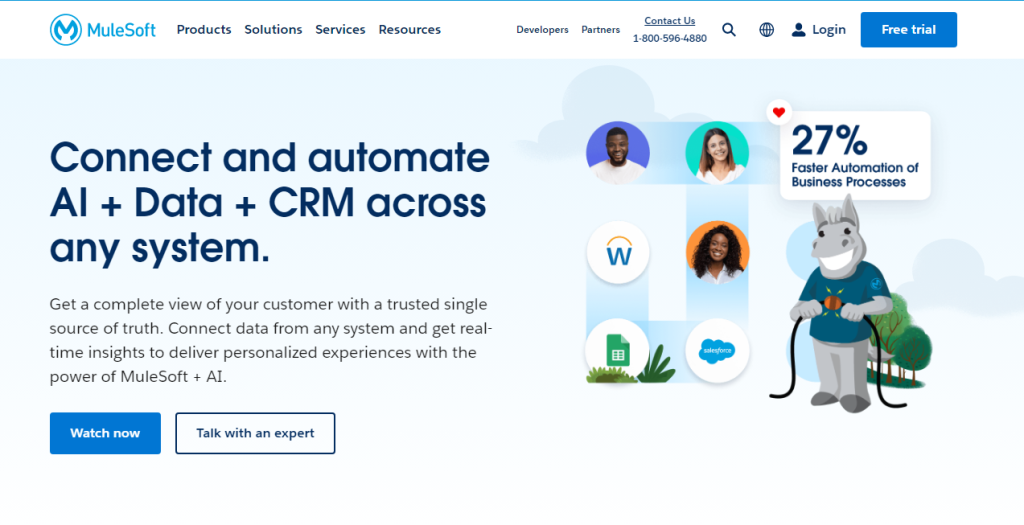
Mulesoft provides Anypoint Studio that can be used as an IDE to develop integrations with various data sources and CRM tools using pre-build connectors. Transformations such as filters, joins, and normalization are available as a part of the IDE, which makes it easier to build custom integrations. In addition to that, there are several products within the Mulesoft ecosystem that make it one of the most robust platforms for data integration.
Key features
- Develop integrations with APIs using AnyPoint API Designer.
- Integration with other tools within the Mulesoft ecosystem.
- Run Mulesoft applications on the cloud using CloudHub 2.0
Use cases
- Salesforce CRM integrations.
- Data orchestration and processing.
Budget
Mulesoft Anypoint offers three tiers of pricing – Gold, Platinum, and Titanium. Based on the use case and data processing requirements, customers can request a quote from Mulesoft.
Industry
- Financial services.
- Government.
- Healthcare.
To learn more about the comparison between Skyvia and Mulesoft, check out this guide.
Matilion
Matilion is an ELT (extract-load-transform) tool that specifically runs on the cloud and is built with the cloud data warehouses in mind. It has native support for Snowflake, Amazon Redshift, Azure Synapse, Google BigQuery, and Delta Lake on DataBricks.
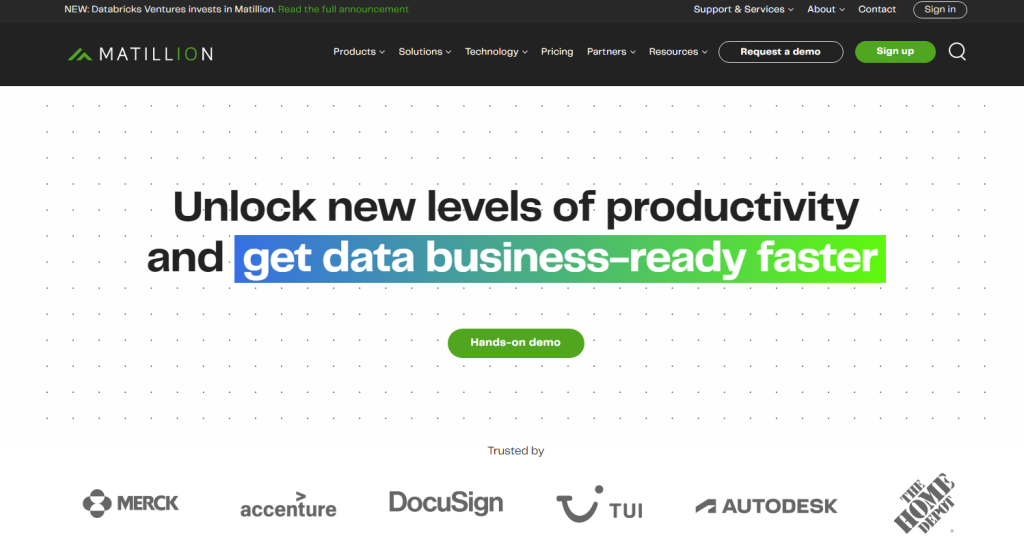
With its intuitive pipeline designer, Matition provides an easy-to-use interface to manage complex data pipelines. It allows users to run performance tests and integrate with version control systems such as git.
Key features
- Native integration with Snowflake
- Universal connectivity with major CRM tools and data sources.
- Robust documentation for most of its connectors.
Use cases
- Data integration and transformation.
- Enterprise data platform.
- Data lakehouse.
Budget
Matilion provides a Free plan to start with processing up to 1 million rows per month. The other plans Basic, Advanced, and Enterprise are priced at 2 USD, 2.5 USD, and 2.7 USD per credit respectively. Matilion credits are a unit of data processing units by Matilion.
Industry
- Retail.
- Banking and financial sector.
To learn more about the comparison between Skyvia and Matilion, check out this guide.
Talend
Another major player in the field of data integration, Talend, is an enterprise-grade tool that is used by major banks and insurance companies. Talend provides a plug-and-play interface that allows components to be stitched in and out while designing complex data processing workflows.
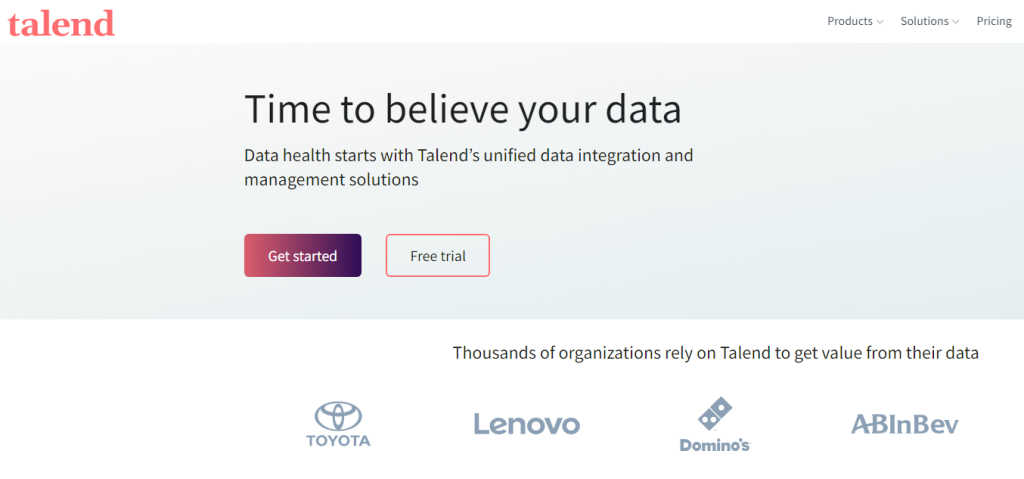
Talend also has an open-source product known as Talend Open Studio for Data integration. In the background, Talend generates Java code that can also leverage other open-source libraries. This also allows developers to inject custom Java code into Talend pipelines to customize their workflow.
Key features
- No code platform.
- Easy integration with Java libraries.
- Support for many databases and data warehouses.
Use cases
- Data integration and data quality.
- Change Data Capture.
- Data catalog.
Budget
Talend offers multiple plans such as Stitch, Data Management Platform, Big Data Platform, and Data Fabric. Based on the use case and team size, customers can choose from these plans and get quotes from Talend.
Industry
Talend is used by industries such as:
- Financial services.
- Healthcare.
- Retail.
- Government.
To learn about the comparison between Skyvia and Talend, check out this guide.
Hevo data
Hevo Data is an end-to-end cloud-based data pipeline platform that allows users to extract data from most of the popular data sources, including SaaS applications and databases. Hevo Data comes with two popular products – Hevo Pipeline for data extraction and Hevo Activate for reverse ETL.
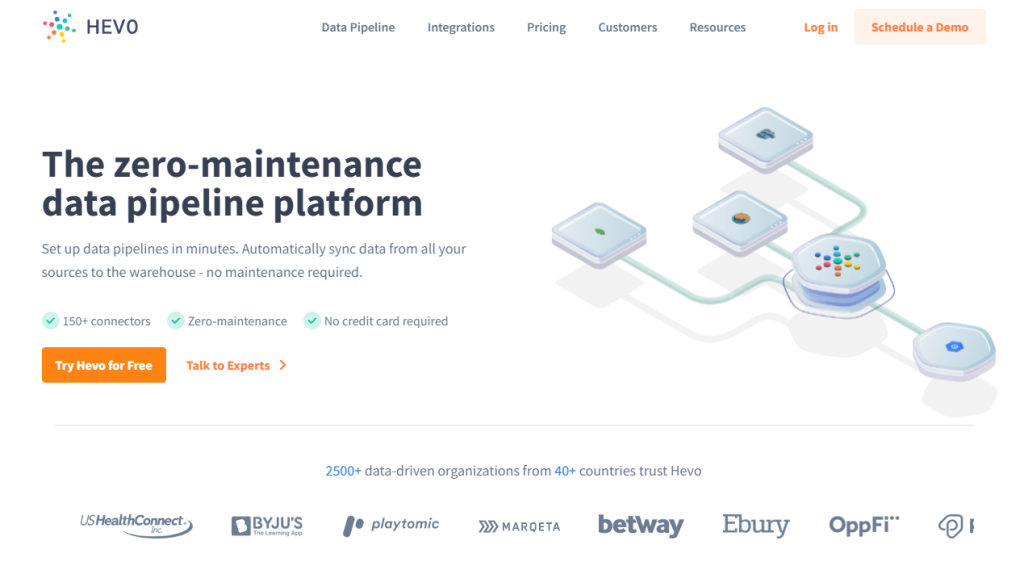
Hevo Pipeline provides an easy-to-use interface to connect to source systems and start extracting data. It has connections available for most common data sources, including Google BigQuery, AWS Redshift, Databricks, etc. Additionally, Hevo Data also allows users to monitor their data pipelines so that in case of any issues, the root causes can be easily detected and mitigated.
There is a free tier available that allows users to begin processing up to 1 million records. Later, you can migrate to any of the usage-based plans if required.
Key features
- No-code platform.
- In-depth documentation.
- More than 150+ data source connectors.
- Observability and monitoring.
Use cases
- Social media analytics.
- Competitive intelligence platforms.
Budget
HevoData Pipeline offers a Free plan for users to get started with it and a 14-day trial for their Starter Plan, which, at the time of writing, is priced at 239 USD per month for processing 5 million events. For large data teams, Hevo Data also offers a Business Plan that customers can negotiate with.
Industry
Hevo Data serves a wide variety of industries, such as:
- EdTech.
- Food delivery platforms.
- IT and software.
To learn more about the differences between Skyvia and Hevodata, check out this guide.
Informatica
Informatica has been one of the leading providers of ETL tools for the past few decades. It provides on-premise as well as cloud-based solutions for data integration.
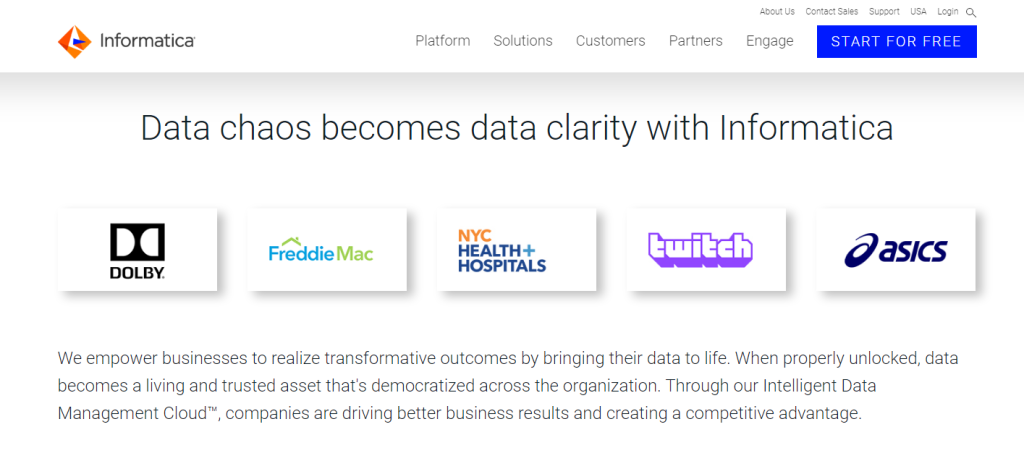
Informatica is majorly focused on enterprise customers that need to process large volumes of datasets with complex security and compliance in mind. In addition to data integration tools, Informatica also provides solutions for data governance and master data management.
Key features
- Enterprise-grade ETL solution provider.
- Provides a pre-paid approach to purchase capacity before executing jobs on the cloud.
- Allows efficient integration with APIs and other SaaS applications.
Use cases
- Data integration and master data management.
- Data integration governance across systems.
Budget
Informatica charges its customers for their usage based on IPUs. An IPU is a unit of processing that a customer can purchase before processing the data. Check out the pricing page for more details.
Industry
Some of the major industries supported by Informatica are:
- Financial services.
- Life science.
- Retail.
- Telecommunication.
To learn more about the comparison between Informatica and Skyvia, check out this guide.
Conclusion
Data integration is a complex subject, and there are a lot of tools and techniques to implement a robust ETL application. In this article, we discussed some of the top data integration providers and their comparison with Skyvia. Skyvia Connectors provide a way to extend Skyvia’s tool base and connect to a plethora of applications.


